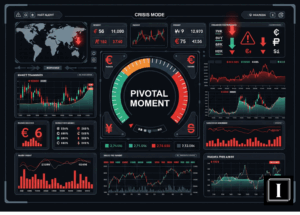🌍 World Economy at a Pivotal Moment, Says BIS
The Bank for International Settlements (BIS), known as the “central bank for central banks,” has issued a stark warning about the fragility of the world economy, citing escalating trade tensions, geopolitical instability, and rising debt levels. In its latest annual report released on June 29, the BIS described the current global financial landscape as a “pivotal moment,” emphasizing growing economic uncertainty and a weakening trust in financial institutions.
Outgoing BIS General Manager Agustín Carstens remarked that a shift toward protectionism—led prominently by the U.S.—is eroding the long-established global economic order. “We are entering a new era of heightened uncertainty and unpredictability,” Carstens stated, adding that this environment is placing intense pressure on public confidence in both governments and central banks.
Trade Wars and Policy Shifts Raise Alarms
One of the most pressing issues flagged by the BIS is the rising tide of protectionism and trade fragmentation. As U.S. President Donald Trump’s trade tariff deadline of July 9 looms, the report reflects concern that such measures are not only inflaming international relations but also worsening long-term declines in global productivity and economic growth.
Carstens noted that these developments threaten to expose deep structural weaknesses within the international financial system. “The trade war and policy shifts are testing the resilience of global systems,” he said. This comes on the back of six months of intensified geopolitical friction and just ahead of a potential turning point in U.S. economic policy.
Fragile Systems and Volatile Outlook
The BIS report also highlighted how the world economy is becoming increasingly susceptible to external shocks. Contributing factors include:
-
An ageing global population
-
Climate change
-
Fractured supply chains
-
High and rising public debt
The post-COVID inflation surge has further complicated matters, with consumers’ perceptions of price stability undergoing significant changes. These shifts could influence economic behavior for years to come.
Hyun Song Shin, BIS’s Chief Economic Adviser, warned that financial vulnerability is growing. “Governments are becoming less able to cushion crises due to mounting public debt,” he said. Military expenditures, if further expanded, could deepen this fiscal strain.
Dollar Decline: No Alarm Yet
The sharp fall of the U.S. dollar—down 10% since the start of the year—was also a key point of concern. Although some have suggested this may indicate a “great rotation” away from U.S. assets, Shin urged caution in interpretation. He explained that while sovereign wealth funds and central banks tend to act slowly, there is no immediate cause for concern.
Short-term movements, however, suggest that hedging strategies by non-U.S. investors may be contributing to the dollar’s decline. “We haven’t seen anything yet that would give us any cause for alarm,” Shin reassured.
Stablecoins and BIS Financials
In a previously released section of the report, the BIS issued a stark warning about the rapid rise of stablecoins, calling for tighter regulatory frameworks to avoid systemic risks.
Financially, the BIS reported strong performance. It posted a net profit of 843.7 million IMF SDRs ($1.2 billion) and a total comprehensive income of SDR 3.4 billion ($5.3 billion)—a record high. Currency deposits at the BIS also reached new levels.
“It is important that the BIS maintains the highest level of creditworthiness,” Carstens emphasized, underlining the organization’s commitment to financial integrity amid turbulent times
Discover deeper insights into the state of global finance—read more from IMPAAKT, your top business magazine.













